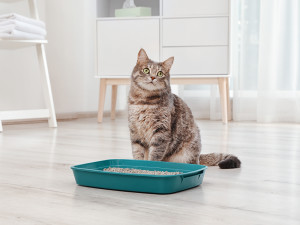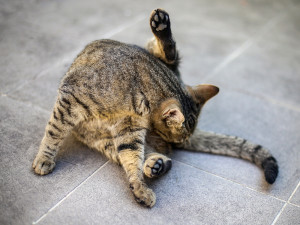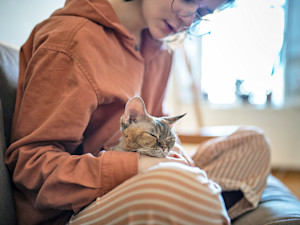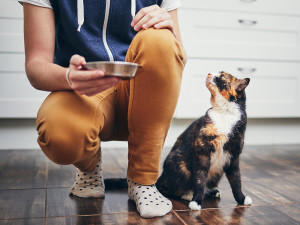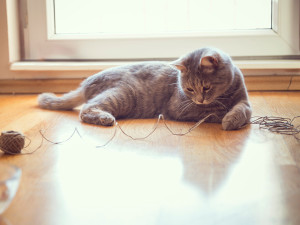How Long Can A Cat Go Without Pooping?

Share Article
In This Article:
Is My Cat Constipated? How Often Should A Cat Poop? Why Isn’t My Cat Pooping?
Although it may seem nice to get a break from fishing kitty nuggets out of the litter box, a disruption of your cat’s normal pooping pattern is a reason for concern.
Regular, formed bowel movements indicate that your cat’s gut health is good. Intestinal, behavioral, and environmental issues can disrupt your cat’s routine. It may not be a huge deal if your cat hasn’t pooped in a day, but how long is too long between poops?

Is my cat constipated?
Cat parents are usually pretty on top of their cat’s poop schedule because they’re the ones who have to keep the litter box fresh. Changes in defecation habits lead to concerned phone calls like this: “My cat hasn’t pooped in five days, and I'm really starting to worry. I've been trying to figure out how to tell if my cat is constipated, but it's tricky because my cat is not pooping but still acting normally. She's eating, playing, napping, and seems otherwise happy, which makes it even harder to know if this is a serious issue or just a temporary blip. I just wish she'd use her litter box so I could stop stressing!”
There’s a lot of gray area between a transient change in litter box habits, constipation, and obstipation (a severe form of constipation). Cats can be finicky about their litter situation, and almost anything can upset their routine. Choosy cats may hold out for a more ideal pooping situation, leading to fewer turds in the litter box and worries about constipation. Let’s explore some common cat constipation symptoms that could indicate a problem.
Signs of constipation in cats
Dry, hard stool
Decreased frequency of defection
Frequent trips to the litter box
Lethargy
Abdominal pain
Straining to defecate
Vocalizing while pooping
Loss of appetite
Vomiting
Cats who are constipated can still pass stool, but they have a harder time doing it or don’t do it as regularly as usual. When a cat completely loses the ability to defecate normally, it’s referred to as obstipation. Repeated episodes of constipation or obstipation can lead to megacolon, a condition in which the large intestine is stretched so severely by the backup of feces that it loses the ability to contract and push stool out. Recognizing the signs of constipation in cats and starting treatment before it becomes a chronic problem can help prevent megacolon.
How often should a cat poop?
Cats go when they want to go. If you’ve lived with your cat for a while, you’re likely pretty familiar with their litter box habits and have a decent baseline for what to expect from them. Most cats poop one or two times a day. Kittens go a lot more frequently. They’re little poop machines, so a kitten not pooping for a day or two is a much bigger concern than an adult cat not going for that long.
If your otherwise healthy cat’s not pooping but eating great and acting normally, it’s generally OK to give it a couple of days and see how things shake out. If your cat hasn’t pooped in seven days, you’ve probably waited a little long to get things checked out. If your cat isn’t pooping and is showing other signs of illness listed above, get them to the vet.
Why isn’t my cat pooping?
In my experience, treating an episode of constipation is often easier (though smellier) than figuring out why it’s happening. Almost every body system can go haywire in a way that results in constipation. Abdominal radiographs are often the starting point for diagnostics, which can go on to include blood work, urinalysis, thyroid testing, abdominal ultrasound, and intestinal biopsies.
Dehydration: Cats are descendants of desert animals, so they’re great at conserving water. When they’re getting dehydrated, their kidneys and colon suck every last drop of water out of their waste. This can help maintain hydration, but results in dry poops that are more difficult to pass.
Foreign material: Cats don’t have the same reputation for eating everything in sight that dogs do, but some cats are a little more curious about sampling things than they should be. Litter, sand, hair, and foreign objects can all cause difficulty defecating. Some of the worst episodes of constipation I’ve seen were caused by bone ingestion. A cat’s stomach is able to dissolve bone, but they’re often left with gravel-like pieces that cause dry, rough, irregular fecal balls that seem very unpleasant to have to poop out.
Obesity: Extra weight brings extra risk for having trouble pooping. Heavier cats have more trouble with constipation than cats with a lean body condition.
Enteritis: We often think of urgent diarrhea when we hear about inflammatory bowel disease (IBD), but one of the side effects of intestinal inflammation is decreased bowel motility. Cats with IBD may poop less often than expected.
Growths: Masses within or around the colon can make it hard for stool to move through and often result in straining.
Pain: To defecate, cats have to be able to get to their preferred area, assume the posture, and push with some force. Cats with orthopedic pain due to arthritis, back pain, or abdominal pain often avoid pooping due to the discomfort involved. Cats with anal gland issues may also avoid pooping due to the pain caused by feces passing by.
Spinal or pelvic injuries: Even after pain has resolved from a spinal or pelvic injury, cats may still have trouble defecating. Lower spinal cord injuries can affect the nerves of the colon and rear end, leading to trouble defecating. Fractures of the pelvis can narrow the pelvic canal or lead to strictures that impede the passage of stool.
Megacolon: Progressive distension and loss of function of the colon can occur with repeated episodes of constipation. Manx cats in particular are predisposed to megacolon due to the spinal cord deformities common in the tailless breed.
Endocrine diseases: Diseases like hyperthyroidism, diabetes mellitus, and chronic kidney disease are all associated with constipation. These conditions can affect a cat’s ability to poop by both decreasing muscle mass and diminishing their water-conserving abilities.
Medications: Just like people, cats can get backed up due to certain medications. Some common culprits include opioid pain medications, antacids, diuretics (water pills), and iron supplements. Cats undergoing anesthesia may not defecate for a couple of days after.
Behavioral or environmental issues: Stressed, anxious cats are more focused on hiding than they are on pooping. This can be due to stress from a move, unexpected commotion, beef with a housemate, an unsanitary litter box, the vacuum cleaner, or pretty much anything.
Fecal matting: Some long-haired cats can get so much poop caught in the hair under their tail that it actually blocks more from coming out. There’s a fun medical word for this condition: pseudocoprostasis, which literally means fake (pseudo-) poop (copro) stoppage (-stasis).
When to seek expert help
If you’re ever worried that your cat is having trouble pooping, talk to your vet’s office. They may advise you to just keep an eye on it, but they’ll be the best judge of how worried you should be based on your cat’s health status and the amount of time that has passed since their last bowel movement. Signs that you should see a vet more urgently include: vomiting, loss of appetite, pain when trying to defecate, constant straining, or passing blood. Even if your cat seems to be feeling well otherwise, check in with your vet if it’s been more than a couple of days since their last bowel movement.
Bottom line
Constipation in cats may be a one-off issue or an indicator of a bigger health problem. There are many causes for a cat to have difficulty pooping, so working with your vet to figure out the cause is important if your cat is repeatedly or severely constipated. Mild constipation can often be treated during an office visit, but more severe constipation can require hospitalization and long-term supportive care. Getting your cat’s constipation addressed early can help to prevent discomfort and progression.
References
Benjamin, Sarah E, and Kenneth J Drobatz. “Retrospective evaluation of risk factors and treatment outcome predictors in cats presenting to the emergency room for constipation.” Journal of feline medicine and surgery vol. 22,2 (2020): 153-160. doi:10.1177/1098612X19832663opens in new tab.
Washabau, R J, and D Holt. “Pathogenesis, diagnosis, and therapy of feline idiopathic megacolon.” The Veterinary clinics of North America. Small animal practice vol. 29,2 (1999): 589-603.

Dr. Bartley Harrison, DVM
Dr. Bartley Harrison is a veterinarian with more than 19 years of experience. He has treated a variety of species in emergency and speciality practices for both large and small animals. His primary interests as a vet are emergency medicine and critical care.
Related articles
![Cat looks at their butt]()
Why Is My Cat Bleeding From Their Anus?
It’s not a pretty problem to have, but it’s important to know how to treat this condition.
![Cat sleeping on woman's lap at home.]()
Kitten Constipation: What to Do When Your Kitten Can’t Poop
It’s more common than you’d think. Here’s how you can help your kitty.
![Domestic life with pet. Man holding bowl with feeding for his hungry cat.]()
What You Need to Know About High-Fiber Cat Food
Beyond your knowledge from old Fiber One commercials, here’s the full report on why your kitty might need fiber in their diet, too.
![Maine coon cat using the litter box.]()
Uncovered Secrets: Why Cats Don’t Always Cover Their Poop
And how you can encourage them to cover up after doing their business.
Why Does My Cat Poop Outside of the Litter Box?
The worst kind of surprise.
![Beautiful playful tabby cat lying on the living room floor, playing with a ball of string.]()
How to Treat Intestinal Blockages in Cats
If you see a string sticking out from, uh, behind, never, ever, ever pull on it.
